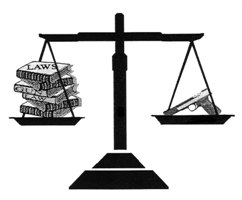Senior Editor
A federal court judge in Maryland has ruled that the state’s concealed carry permit requirement that citizens show “good and substantial reason” for getting a permit is unconstitutional.
The ruling, from Judge Benson Everett Legg, set off tremors throughout the gun prohibition movement, because his ruling, among other things, noted, “The Court finds that the right to bear arms is not limited to the home.”
This refutes a claim by gun control advocates and even some lower court federal judges that the Second Amendment right to keep and bear arms is limited to the confines of one’s home.
The case, brought by the Second Amendment Foundation with support from Maryland Shall Issue, is another victory for the same group that brought McDonald v. City of Chicago to the U.S. Supreme Court in 2010. SAF founder and Executive Vice President Alan Gottlieb told TGM, “The federal district court has carefully spelled out the obvious, that the Second Amendment does not stop at one’s doorstep, but protects us wherever we have a right to be.”
The case involved Maryland resident Raymond Woollard, whose application to renew his handgun carry permit was arbitrarily turned down by Maryland officials, even though he had already been issued a permit following a confrontation in his home. Woollard had been attacked by a man who went to prison for the offense, Kris Lee Abbott. Woollard aimed a shotgun at Abbott, who wrestled it away, but let go when Woollard’s son aimed a second gun at him.
The confrontation lasted for some 2 ½ hours while Maryland police tried to find the Woollard residence. Judge Legg included that detail in his ruling.
After Abbott man was released from prison, he moved to within three miles of Woollard’s home. Woollard was stunned that his renewal application was rejected on the grounds that he could not show a “good and substantial” need. Judge Legg shot that down, noting, “A citizen may not be required to offer a good and substantial reason why he should be permitted to exercise his rights. The right‘s existence is all the reason he needs.”
Judge Legg’s ruling could pave the way for further Second Amendment challenges of state and local gun laws, in states such as New Jersey, New York and California, where issuing agencies or officials still exercise a considerable amount of discretion in the issuance of carry permits.
Gottlieb gave ample credit to Virginia attorney Alan Gura, who argued both the Heller and McDonald Second Amendment cases before the U.S. Supreme Court. The latter case was a SAF undertaking, which overturned the Chicago handgun ban and incorporated the Second Amendment to the states.
The 23-page ruling will likely be appealed, Gottlieb acknowledged, but that may not be a bad thing because eventually the case could go before the Supreme Court, leading to a high court ruling that further expands on the Second Amendment.
Judge Legg also seriously damaged the continuing contention by gun prohibitionists and even some other federal judges that both the Heller and McDonald rulings have limited the right to keep and bear arms to the confines of one’s home.
In a single sentence, he demolished that contention: “In addition to self-defense, the (Second Amendment) right was also understood to allow for militia membership and hunting. To secure these rights, the Second Amendment‘s protections must extend beyond the home: neither hunting nor militia training is a household activity, and ‘self-defense has to take place wherever [a] person happens to be’.”
Judge Legg, who was appointed to the Maryland District Court in 1991 by then-president George H.W. Bush, served as chief judge up to 2010, according to a biography on Wikipedia.
“Those who drafted and ratified the Second Amendment surely knew that the right they were enshrining carried a risk of misuse,” Judge Legg wrote, “and states have considerable latitude to channel the exercise of the right in ways that will minimize that risk. States may not, however, seek to reduce the danger by means of widespread curtailment of the right itself. [E]ven the most legitimate goal may not be advanced in a constitutionally impermissible manner.”




